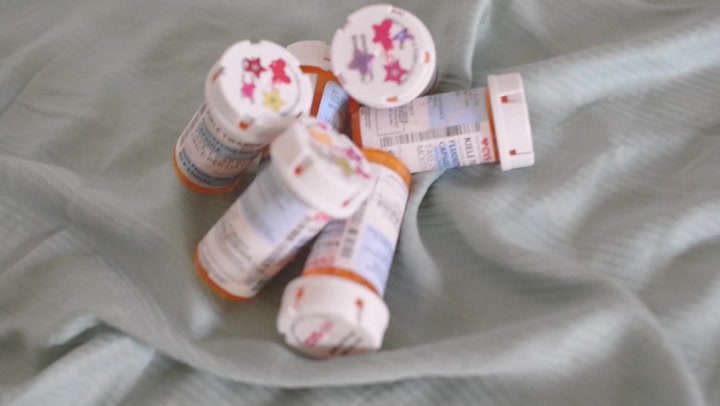


During the spring quarter of my junior year of college, my mental health started rapidly spiraling downwards. In the ten week period, I carried my film camera everywhere with me and documented myself more or less falling apart. On June 1, I presented my photo final project, titled why r u so sensitive???, to my class. That night, I was broken up with and hysterically cried myself to sleep. On June 2, prompted by the break-up and the realization that it couldn’t get any worse, I took Prozac (which I had been prescribed weeks earlier but was too afraid to take) for the first time.
I had tried taking antidepressants in high school, but I felt so anxious taking them that I stopped after only a few days, deciding instead to deal with my anxiety, depression, and panic attacks on my own. At the time, I was having debilitating panic attacks daily and crying regularly. I dealt with these things because I didn’t know any differently. For my first three years of college, I just suffered through it all. It wasn’t until the final quarter of my junior year—when I was crying every single day, multiple times a day, for hours at a time—that I had to finally admit I couldn’t manage on my own. I felt no hope for my future. I would wake up in the middle of the night in panic. Things had been bad for months, but it wasn’t until mid-May that I made a psychiatrist appointment after crying on the phone to my mom, telling her I couldn’t live like this anymore. My fear of medication was still present, but my fear of being alive while suffering so much was even greater.
The morning following my-break up, I woke up and took Prozac. I anxiously waited for it to do something, not entirely realizing that it typically takes antidepressants about 4-6 weeks to make any noticeable improvement. The next week was a blur. I stopped eating, I couldn’t sleep, and all I could do was cry. On June 8, I called my dad, hysterical, and told him that I wanted to die. The very next day I was on a flight back home to Chicago.
On June 16, I had a psychiatric evaluation at a behavioral health center, where they recommended I be placed in a partial hospitalization program. I attended therapy for five days a week, six hours a day. I spent the entire month of June unable to even pick up a camera. I was in so much pain that basically all I did was attend therapy, sleep, and cry. After about a month on Prozac, I began to have glimpses of feeling like things would be okay. I realized I needed to be creating to get myself through this darkness.
With the support and encouragement of Adolescent, I began filming this mental health video diary. The video captures my summer spent at home, where I attended the first intensive therapy program. It then follows me to Savannah, when I tried to go back to school, saw a different psychiatrist, was incorrectly diagnosed with bipolar disorder, prescribed an antipsychotic, and finally decided to take off fall quarter of my senior year to adjust to new meds and a new diagnosis.
When I started filming, I truly believed this video was going to have a happy ending. However, I stopped filming once I started taking an antipsychotic that made me feel numb, hysterical, and suicidal. I left Savannah once again, defeated by my mental health. It took me months, a residential treatment stay, a second partial hospitalization, a new but not entirely definitive diagnosis of complex PTSD, medication adjustment, and taking off yet another quarter of school for me to be ready to edit this video. Previously, it was too difficult for me to look at the footage and relive all the pain that my summer of treatment and the following months had brought me.
What I did learn is that recovery is slow, painful, and far from linear. I learned that time, vulnerability, and self-compassion are invaluable—and perhaps much more important to my own recovery than any medication I’m taking. Treatment has taught me that there is no shame in needing to take medication; for me, personally, it’s been a necessary part of my recovery. But perhaps the most profound realization I had was that I wouldn’t have made it to this point without a camera in my hands and an incredible network of support.
Richelle Chen
Ambar Navarro
Gabrielle DeCaro
Marian McColm